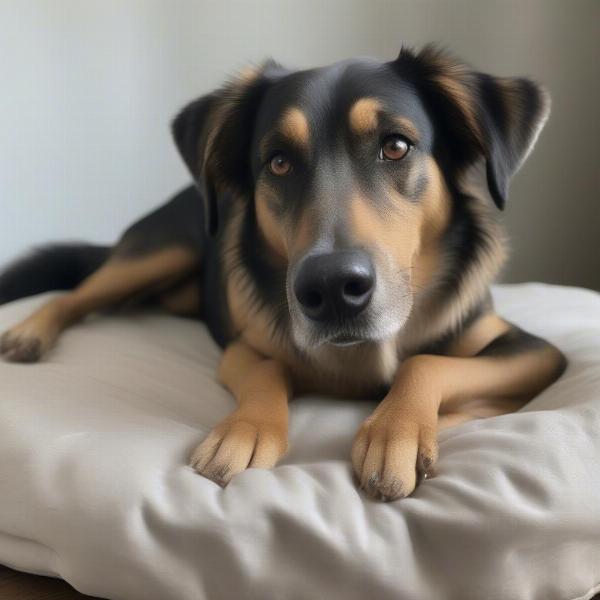Excessive panting in an elderly dog can be concerning for any owner. While some panting is normal, especially after exercise or in hot weather, frequent or heavy panting in older dogs can be a sign of an underlying health issue. Understanding the potential causes and knowing when to seek veterinary attention is crucial for ensuring your senior dog’s well-being.
Why is My Older Dog Panting So Much?
Several factors can contribute to increased panting in elderly dogs. Some of the most common reasons include pain, heart problems, respiratory issues, anxiety, and cognitive decline. It’s important to observe your dog’s behavior and look for other accompanying symptoms to help determine the cause.
Pain and Discomfort
As dogs age, they are more prone to conditions like arthritis, hip dysplasia, and other joint issues. Pain can cause increased panting as your dog tries to cope with the discomfort. Observe your dog for signs of stiffness, limping, or reluctance to move.
 Elderly Dog Panting Due to Pain
Elderly Dog Panting Due to Pain
Heart and Respiratory Problems
Heart disease and respiratory issues become more common in senior dogs. Conditions like congestive heart failure, collapsing trachea, and chronic bronchitis can make it difficult for your dog to breathe, leading to increased panting. Look for additional signs such as coughing, wheezing, or a bluish tinge to the gums.
Anxiety and Cognitive Decline
Aging can also affect a dog’s mental well-being. Anxiety, often triggered by changes in routine, loud noises, or separation, can cause panting. Cognitive dysfunction syndrome (CDS), similar to dementia in humans, can also lead to increased panting and confusion.
When to Seek Veterinary Attention
If your elderly dog’s panting is sudden, severe, or accompanied by other symptoms like coughing, vomiting, or collapse, seek immediate veterinary care. Even if the panting seems mild but is persistent or unusual for your dog, it’s important to schedule a check-up. Early diagnosis and treatment can significantly improve your dog’s quality of life.
Managing Panting in Elderly Dogs
Once your veterinarian has determined the underlying cause of your dog’s panting, they can recommend appropriate treatment. This may involve medication, lifestyle changes, or supportive care.
Creating a Comfortable Environment
Providing a cool, quiet, and comfortable environment can help reduce panting, especially in dogs experiencing pain or anxiety. Ensure your dog has a soft bed and easy access to fresh water.
Maintaining a Healthy Weight
Obesity can exacerbate many health problems, including heart and respiratory issues. Maintaining a healthy weight through a balanced diet and regular exercise (as tolerated) is crucial for your senior dog’s well-being.
Supportive Care and Medications
Depending on the diagnosis, your veterinarian may prescribe medications to manage pain, anxiety, or heart and respiratory conditions. Supportive care, such as physical therapy for arthritis or oxygen therapy for respiratory problems, can also be beneficial.
Conclusion
Excessive panting in an elderly dog shouldn’t be ignored. It can be a sign of a serious underlying condition requiring veterinary attention. By understanding the potential causes and seeking timely veterinary care, you can help ensure your senior companion enjoys a comfortable and fulfilling life.
FAQ
- Is it normal for older dogs to pant more than younger dogs? While some increase in panting can be expected with age, excessive or sudden changes in panting should be investigated.
- What are the signs of pain in elderly dogs? Signs of pain can be subtle and include stiffness, limping, reluctance to move, changes in appetite, and increased panting.
- How can I help my anxious senior dog? Creating a calm and predictable environment, providing a comfortable bed, and using pheromone diffusers can help reduce anxiety.
- What is cognitive dysfunction syndrome (CDS)? CDS is a condition similar to dementia in humans, and can cause confusion, disorientation, changes in sleep patterns, and increased panting.
- What should I do if my dog starts panting heavily and collapses? This is a medical emergency, and you should seek immediate veterinary attention.
About ILM Dog
ILM Dog is your trusted source for expert advice on dog care and wellbeing. We provide comprehensive information on breed selection, health, training, nutrition, grooming, and more, catering to dog owners of all experience levels. Our mission is to empower you to provide the best possible care for your canine companion. For personalized guidance, contact us at [email protected] or +44 20-3965-8624.